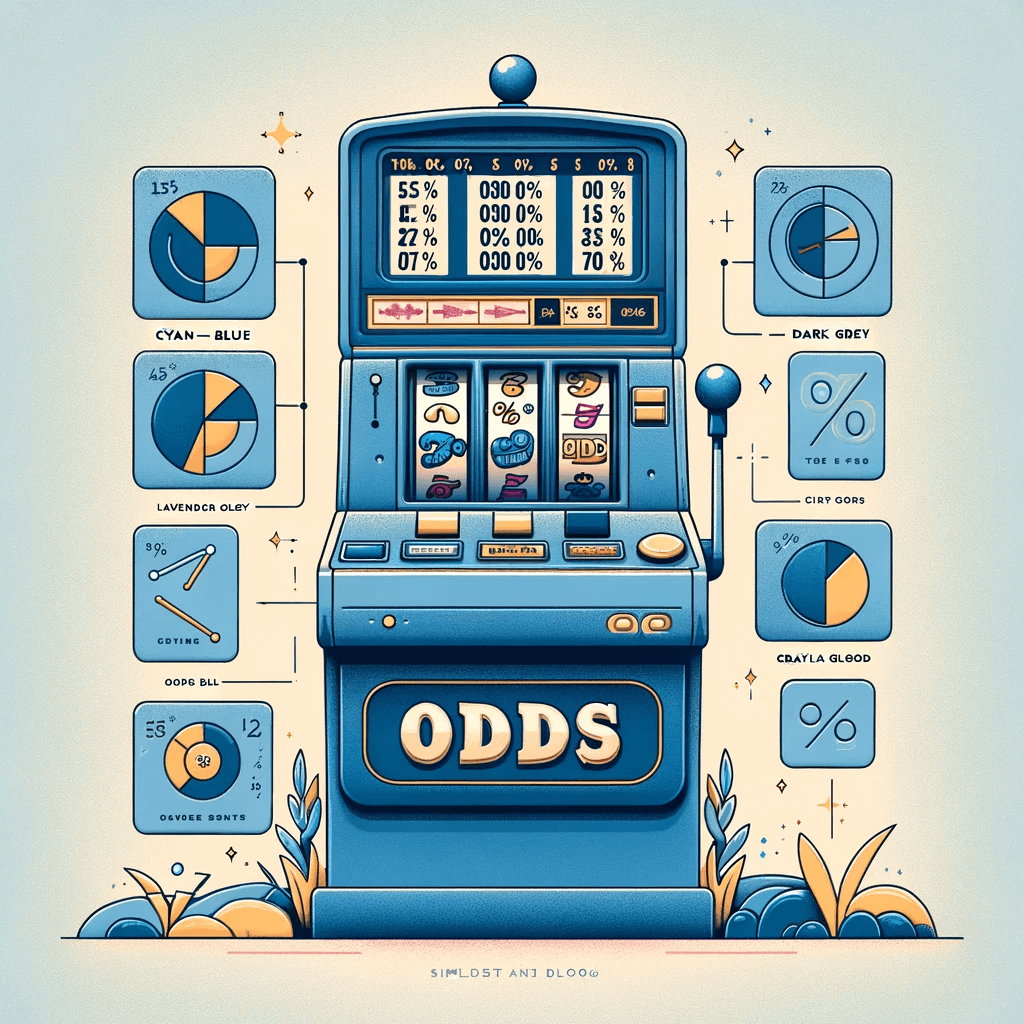How Do Slot Machines Work: The Math Behind it All
At the midway mark, 2023 is still on course to beat 2022 as the year with the largest revenue in the history of the gaming business. With the first-half revenue of $29.16 billion, 2023 is already approximately 18 percent ahead of last year. And slot machines generate most of the gaming industry’s income.
So, how do slot machines work? There are two types of slots: modern computer technology runs online slots, while older slot machines run on mechanical systems.
This article reviews their build, fairness policy, and everything else, so read on.
🏆 Top Slots Gambling Sites
Considering various factors, here are the best online slots casinos with popular slots games suitable for both beginners and pros:
DuckyLuck
->💰 500% Welcome Bonus up to $2,500
-> 🎰 30 Free Spins (No Deposit Required)- VegasAces
->💸 $5000 Welcome Bonus
-> 🎁 $100 Free Chips Reward on the 21st of the Month - SlotsAndCasino
-> 💸 300% Match Bonus of up to $1,500
-> 🎰 100 Free Spins
Understanding Slot Machines
There’s a probability you’ll win every time you spin the reels. When you spin, the machine randomly selects a series of numbers. These numbers determine where the symbols land on the screen. The amount of the payout depends on the symbols that you end up landing on and the machine paytable. You receive a payout if the symbols line up in a winning combination.
Before proceeding further, let’s briefly review slot machine technology to understand better old and modern slot machines and how they differ.
The Technology of Slot Machines

The same principle applies whether you play a game on a modern slot machine or on an old-timer.
The player pulls the lever or pushes a button that activates a series of reels, determining the outcome. The number of reels is typically three or five, each with a different number of symbols. These symbols range from a few dozen to hundreds, depending on the particular slot machine.
The Mechanism Behind Early Slot Machines
Conventional, mechanical slot machines use a series of gears and levers to operate.
The coin detector registers when you insert coins to play slot games and unlocks the brake, allowing the handle to move. A metal shaft in the center supports the spinning reels, while a braking system stops the reels. Sensors communicate the reel positions to the payout system. Generally, physical slot machines have over 20 symbols per reel.
Newer Slot Machines
The video slots’ design resembles the technology of old machines, but only on the outside. Inside, they’re run by a central computer that uses a random number generator (RNG) program to determine the outcome of each spin.
Computerized slot machines use step motors to turn the reels and stop them at a predetermined point. The computer controls digital pulses driving these motors, which move with precision. The number of virtual reel symbols per reel that digital technology allows is 256.
Slot Machine Gaming: Ensuring Fairness
When it comes to ensuring slot machines’ fairness when you play, there’s always a chance for you to win the game. That’s because slots use a random number generator. Thus, each spin is independent of the last and doesn’t influence the outcome of the next. Each spin has the same chance of winning as any other.
The odds, on the other hand, are always different as they depend on the game and the house edge. Let’s see how this works.
Random Number Generator
Random number generators are an essential part of slot machines. Slots are programmed with a set of possible outcomes, and each time you pull the lever or hit the spin button, the random number generator chooses which outcome will occur. While it may seem like slots are just games of chance, the truth is that they’re actually quite complex. Random number generators help to ensure that every spin is fair and unpredictable and that the odds of hitting a jackpot are the same for every player.
What’s more, random number generators can also be used to create other types of games, such as roulette and blackjack. The RNG is what makes slots fair and unpredictable. If a player hits the winning combination on the first spin, they could do it again on the next one or not see it for thousands of spins. In the last few years, online casinos have increasingly started incorporating provably fair algorithms with their crypto-focused slots, as these algorithms are immediately verifiable by the user.
That’s, in short, how slot machines work. You win if the random number generator matches a pay-line when you activate the play on the slot machine.
Symbol Selection
An RNG picks a random number for each reel stop on a slot machine. When you hit the spin button or the lever, the game chooses the numbers (and symbols, accordingly) associated with each reel and combines them to create your result. If you’re lucky, the machine pays out your reward.
You should note that the result is already determined when the reels spin on the gambling machines. The presence of the physical or virtual reel that spins makes no difference since the outcome was already decided when you hit the button. So, the actual reels spinning is there just for the show.
Odds of Slot Machine Games

To determine how likely players are to win slot games at brick-and-mortar or online casinos, we must first define the house edge and the price of a slot.
The House Edge
Casinos providing the service have to make a profit too. But how do slot machines work to provide income? Most casinos feature a house edge (also known as house advantage) of up to 10%, meaning that the casino expects a 10% gain from all wagers.
The Slot Price
Since the casino’s management and individual players define the price differently, the price of a game depends on the perspective of each participant. The slot machine pull price is determined by the casino. The higher the price, the higher the payout for a winning spin. But casinos also take into account things like player traffic and how well slots are paying out.
If slots aren’t paying out well, casinos may lower the price in order to attract more players. Conversely, if slots are paying out well, casinos may raise the price in order to make more money. For a player that wagers $10 and loses, the cost of a single slot pull is $10. However, from the management’s standpoint, the “price” it charges is the 10% it anticipates getting from gamblers.
The Gain Probability for Players
The house edge is the statistical advantage that the casino has over the player. The size of the house edge depends on the game, with some games having a very small house edge and others having a much larger one.
With the house edge for a slot machine game in place, it’s clear that the chances of a win favor the casino. One of the ways that casinos ensure that they have an edge is by offering different payouts for different bets.
For example, in roulette, a bet on a single number pays out 35 to 1, while a bet on a red or black number pays out only 1 to 1. This difference in payouts means that, over time, the casino will always come out ahead on bets where the payout is less than 35 to 1. This is because, on average, each spin of the roulette wheel will result in one winning number and 35 losing numbers. As a result, for every 35 spins, the casino will win once and lose 34 times. Since each winning bet pays out less than the total amount of money bet, the casino will always come out ahead in the long run.
Payback Calculation
We need to calculate the slot payback to determine the chances of winning a casino game. Different payout systems used in slot machines are out there, but let’s take scoring a jackpot combination on a three-reel slot machine as an example.
Say there are 128 reel stops in modern slot machines controlled by a computer. The three reels, each with a possibility of 2/128 of getting the jackpot symbol, put your odds of hitting the jackpot at 1 in 262,144. Therefore, the likelihood of all three reels containing the jackpot symbol is 2/128 x 2/128 x 2/128, which equals 262,144.
Further calculation shows that the probability of scoring a jackpot in an electronic slot machine is 0.000004. With a payout (the return to players) of 1,666 for the jackpot, the payback percentage is 0.7% (probability times payout). By adding up all other scoring probabilities (0.1% for three cherries, 7.3% for three sevens, etc.), we come to a total payback of around 90%. That means players get back roughly 90 cents for every dollar put into every slot game ever played.
Wrapping Up
Since the introduction of online gambling in 1994, the number of gamblers playing from the comfort of their homes compared to those playing in physical locations has risen to 96%. Thus, playing on online slots prevails over playing on a classic slot machine. Still, that doesn’t take away from the brick-and-mortar casinos, as slot machines are designed to be addictive.
One of the more usual methods for attracting players into land-based venues is through lucrative slot tournaments. Casinos know that the lure of winning money will keep people coming back for more, and they use this knowledge to make billions of dollars each year.
Casino slot machines work on algorithms, and each gambling venue has a house edge, granting them a certain profit. So, make sure never to wager more money than you’re willing to lose. While you may not be able to beat the system, you can still enjoy playing slot machines without risking too much money.
Just remember to gamble responsibly and have fun!
FAQ
How do you win at slot machines?
You can’t beat slot machines as they were designed to give casinos a long-term edge. However, you may be able to improve your chances of winning by using strategies such as choosing games fitting your goals, picking higher denomination slots, and playing a casino game machine by the end of a row.
Are slot machines truly random?
All slot machines use a random number generator (RNG) to ensure that the result of each game is fair and unpredictable.
Is there a secret to winning on slot machines?
Finding a slot machine with the highest odds of winning is the secret to success. A few slots with the highest return to players (RTP) are Ugga Bugga and Mega Joker.
What triggers a jackpot on a slot machine?
Slot machines are a popular form of gambling, but what many people don’t know is how do slot machines work. Contrary to popular belief, slot machines are not completely random. The jackpot is triggered by a specific combination of symbols on the reels. When you pull the lever or push the button, the random number generator generates a mixture of symbols. If the given combination matches the jackpot combination, you win big time.
 BC.Game
BC.Game  7Bit
7Bit  Ducky Luck
Ducky Luck  Red Dog
Red Dog